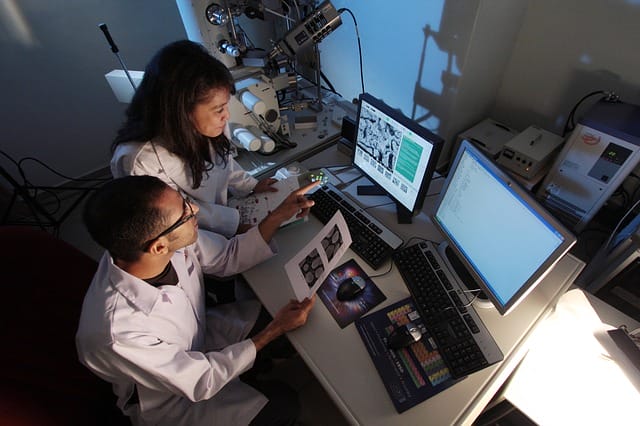If you are just visiting, you can catch up with Chapter 1 of the book for introverts who want a communication advantage, Communication Toolkit for Introverts, at these links:
Introduction to Communication Toolkit for Introverts
What are the differences between introvert and extrovert communication?
Communication myths about introverts
Reasons why an introvert may not want to act like an extrovert
And now to:
Should you pay attention to studies that show extroverts are generally happier?
What if you knew being happier would help you be or at least appear more gregarious and lively and so then likely to increase performance?
Which approach would you take: play to your strengths or reinforce your weaknesses?
Wake Forest University published findings in a 2012 article in the Journal of Personality, which show that when introverts act extroverted, they too feel happier. It is a compelling finding that may invite introverts to move over to the extrovert way of being.
One theory put forth is extroverts are happier because they have a greater sensitivity to dopamine; they need more of it to make them happy. It wires the extrovert brain to act more motivated to get a reward, like giving a presentation and then either hearing applause or being recognized for good work.
But there is no conclusive evidence of why this happens. It’s actually more scientific evidence that all is not always what it appears to be.
Furthermore, no one has broadened the study to explore whether this dedicated concentration to go against what nature wired us for is going to use up energy.
 When we act in ways that are not natural to us, there can be a battle between what is comfortable and what is not comfortable. When our nature is to be prepared and suddenly we are called on in a meeting to make an impromptu presentation, guess what happens to our energy? We struggle to make it a winning performance and in the end, all the air is out of us like a popped balloon.
When we act in ways that are not natural to us, there can be a battle between what is comfortable and what is not comfortable. When our nature is to be prepared and suddenly we are called on in a meeting to make an impromptu presentation, guess what happens to our energy? We struggle to make it a winning performance and in the end, all the air is out of us like a popped balloon.
Here is one possibility of why acting like we are something we are not normally may work in the short-term, but not necessarily in the long term.
If we have too much dopamine in the introvert brain then we can feel over stimulated, and have “stimulus fatigue”. Our brains have a longer pathway of blood flow, and more blood traveling to it, making us even more sensitive. More dopamine just exhausts us and depletes our energy. That same longer pathway is activated by acetylcholine, which gives us a happy feeling that extroverts don’t get from just thinking and feeling.
While studies may conclude introverts are happier when they act more outgoing, if it is at the expense of daily exertion which could lead to energy exhaustion, then it may work in smaller doses, not all day long.
Alice Domar, Ph.D., a psychologist and author of Be Happy Without Being Perfect, says, “If you think you should feel happy nearly all the time, it’s going to make you miserable.”
If being more extroverted means striving for constant contentment, then Domar’s advice for the introvert might be to strengthen the introvert within.
If focusing, researching, and planning make you happy, then would it be more accurate to conclude, “do what makes you happy, not what someone else says makes them happy.”
Coming up next for you, the final section of Chapter 1:
How managers can create a work environment for both introverts and extroverts to thrive
 Three ways to get the information you want in this chapter (images used are not necessarily in the printed publication):
Three ways to get the information you want in this chapter (images used are not necessarily in the printed publication):
- If you want small doses of the first chapter, subscribe to the blog in the red sign-up box on the home page to get notices of each blog post.
- If you want to read the whole chapter without giving any email or getting on any list, go to https://bit.ly/CTIonPackt and read at your leisure.
- If you want a PDF copy of this chapter’s 15 pages, please share this post, let me know in an email to patricia (@) patricia-weber.com the link that shows where you shared it. It will be delivered quickly to you!
Balloon image, Copyright 2015 Patricia Weber
Science image, courtesy httpss://pixabay.com/

The whole time I was reading I’m nodding my head in agreement. I read part of that study you referenced, and I also found an article on a corresponding study disputing the findings in that report because it said they based the criteria on extrovert behaviors and didn’t take into consideration that Introverts express happiness in different ways. I’m going to make myself crazy now trying to find that study – but for now I am really enjoying your book Patricia and happy to share!
For me it was a “gotcha” moment Marquita. At first glance it might seem that introverts want to jump on the extrovert wagon. But if you think about it – do what makes you happy, not what makes someone else happy, makes so much more sense! Studies or not!
I often wonder who says who is happier. A person may be happy being a loner, as I am. But those who are not put their own twist to it, portraying me as unhappy because I am not like them. As person can be happy, but not look at themselves as happy. Think about this, is a hypochondriac sick, even though there is nothing wrong with them, but they think they are sick?
I always take these studies with a grain of salt. Maybe that’s why I hay high blood pressure.
Yes William, we make our own happiness don’t we? It’s just that there are people who think their way is THE way and that’s where the misunderstandings begin.
Patricia — I agree that whether you’re an introvert or extrovert you can’t deny your basic personality by trying to something you’re not. But you can also use that as an excuse not to get out of your comfort zone to try new things. It’s just easier to go with the flow. Sometimes introverts need to to be more outgoing to express their points of view and sometimes extroverts need to shut up!
For certain if we stretch beyond what’s comfortable we might find there is something different that we like. Just like we want to recognize that one introvert is not like the next introvert and one extrovert is certainly not like another extrovert. There is more to us than just the label. Thanks Jeannette.
Patricia, it may be that in general the studies are right.
Personally believe however that how happy you are in life is very much determined by other factors as well. Not least how you perceive what happens to you. Another very important factor is if you have reached the level where you understand that most things in life are actually not really important and don’t waste time on them.
Unhappy people tend to perceive everything that happens in negative ways and worry about issues of little, or no, importance.
Perception IS reality – is that the expression Catarina? I so agree with you take on what makes us happy.
This is very interesting. This could make sense because risk takers are almost always extroverts. And risk takers usually need more dopamine and adrenaline which is why they crave the extra surge of risk taking. It does make me wonder though; If someone didn’t have enough dopamine for their needs, (which from a holistic health standpoint is considered an imbalance), and they achieved changes that balanced their dopamine levels, would they become less extroverted? Hmmm, a really interesting concept.
Less extroverted simply means – needing less stimulation Erica. Using this more widely accepted definition, and living with a wide open extrovert, I do see times when he needs a little less stimulation, like me.
I found this entire book enlightening! But this first chapter really gave me a jump start…captured my interest! I live by ‘I Gotta Be Me,’ but do try to step out of of my comfort zone now and then:) Not always in agreement about risk taking. Plenty of introverts take plenty of risks, from the comfort of their homes!
Jacqueline, like some others are commenting, and I am in total agreement – not all introverts (or extroverts for that matter) are the same. That’s because the i/e in us is just one part of who we are and who we have learned to be. Thanks for being a fan of the entire book – that KICKs my weekend into higher gear.